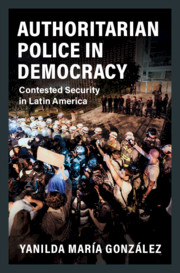Book contents
- Authoritarian Police in Democracy
- Cambridge Studies in Comparative Politics
- Authoritarian Police in Democracy
- Copyright page
- Contents
- Figures
- Tables
- Acknowledgments
- 1 Police
- 2 Ordinary Democratic Politics and the Challenge of Police Reform
- Part I Persistence
- Part II Reform
- Introduction: Pathways to Democratic Coercion
- 6 “New Police,” Same as the Old Police
- 7 The Social and Political Drivers of Reform in Buenos Aires Province and Colombia
- 8 Conclusion
- References
- Index
- Other Books in the Series (Continued from page ii)
Introduction: Pathways to Democratic Coercion
from Part II - Reform
Published online by Cambridge University Press: 30 October 2020
- Authoritarian Police in Democracy
- Cambridge Studies in Comparative Politics
- Authoritarian Police in Democracy
- Copyright page
- Contents
- Figures
- Tables
- Acknowledgments
- 1 Police
- 2 Ordinary Democratic Politics and the Challenge of Police Reform
- Part I Persistence
- Part II Reform
- Introduction: Pathways to Democratic Coercion
- 6 “New Police,” Same as the Old Police
- 7 The Social and Political Drivers of Reform in Buenos Aires Province and Colombia
- 8 Conclusion
- References
- Index
- Other Books in the Series (Continued from page ii)
Summary
Alberto Piotti, the former secretary of security of Buenos Aires Province, emphasized in an interview the dilemma posed by security, a policy area he viewed as producing few political benefits even when things go well. As Piotti put it, “inaugurating a jail is not the same as inaugurating a hospital.” For this reason, Piotti described his mandate from the governor as “plugging holes, not searching for fundamental solutions.” While Piotti is especially pessimistic about his time as security secretary (see Chapter 4), his remarks are illustrative of the broader hesitation of political leaders to undertake police reform, resulting in the high degree of institutional persistence documented in the preceding chapters. When faced with police forces implicated in politicized coercion and a range of conduct that systematically contravenes the rule of law with negligible external accountability, political leaders across the three cases, like Piotti, routinely sought to “plug holes” rather than “search for fundamental solutions.” Over the course of three decades, successive leaders in São Paulo State, and more broadly at the federal level in Brazil, contemplated similar reform strategies – including demilitarization, unification of the two police forces, and strengthening civilian oversight – but have consistently avoided structural reform of a highly violent and unaccountable police (Chapter 3).
- Type
- Chapter
- Information
- Authoritarian Police in DemocracyContested Security in Latin America, pp. 213 - 222Publisher: Cambridge University PressPrint publication year: 2020



